William Ellison was one of the wealthiest men in the South as well as being a black, former slave. He owned cotton gins, plantations, and 68 slaves… and from accounts of the time, he wasn’t very nice…
Category Archives: Mr. Adair’s Classroom
They Thought They Were Free
History repeats because human nature remains the same…
But Then It Was Too Late
 What no one seemed to notice,” said a colleague of mine, a philologist, “was the ever widening gap, after 1933, between the government and the people. Just think how very wide this gap was to begin with, here in Germany. And it became always wider. You know, it doesn’t make people close to their government to be told that this is a people’s government, a true democracy, or to be enrolled in civilian defense, or even to vote. All this has little, really nothing, to do with knowing one is governing.
What no one seemed to notice,” said a colleague of mine, a philologist, “was the ever widening gap, after 1933, between the government and the people. Just think how very wide this gap was to begin with, here in Germany. And it became always wider. You know, it doesn’t make people close to their government to be told that this is a people’s government, a true democracy, or to be enrolled in civilian defense, or even to vote. All this has little, really nothing, to do with knowing one is governing.
“What happened here was the gradual habituation of the people, little by little, to being governed by surprise; to receiving decisions deliberated in secret; to believing that the situation was so complicated that the government had to act on information which the people could not understand, or so dangerous that, even if the people could not understand it, it could not be released because of national security. And their sense of identification with Hitler, their trust in him, made it easier to widen this gap and reassured those who would otherwise have worried about it. Continue reading
Don’t Cheer Woodrow Wilson’s Cancellation
Rather than taking scalps of our own, what the right needs is an arms-linked defense of our history, culture, art, and institutions, imperfect though all that might be.

First things first: Woodrow Wilson was a deplorable bigot and one of the worst presidents in American history. He re-segregated the federal government, glamorized the Ku Klux Klan, screened The Birth of a Nation at the White House, and opposed Reconstruction and black suffrage (Dylan Matthews has more on Wilson’s racism). In common with many progressive intellectuals of his time, he was a champion of eugenics. He sank the United States into the pointless carnage of World War I. He viewed the Constitution as outmoded and sought to snap its restraints on executive power. Continue reading
The Last Slave Ship Survivor Gave an Interview in the 1930s
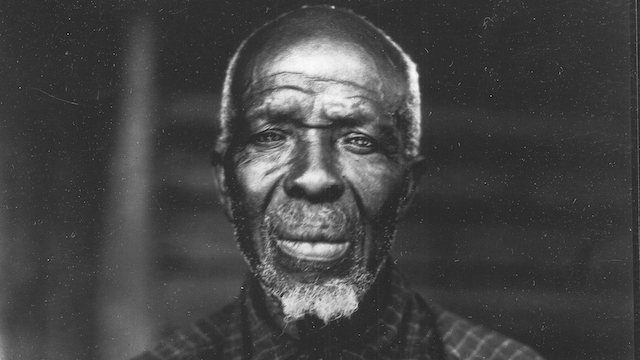
Roughly 60 years after the abolition of slavery, anthropologist Zora Neale Hurston made an incredible connection: She located the last surviving captive of the last slave ship to bring Africans to the United States. Continue reading
From the Boston Massacre to the Boston Tea Party: Massachusetts Kicks Off a Revolution
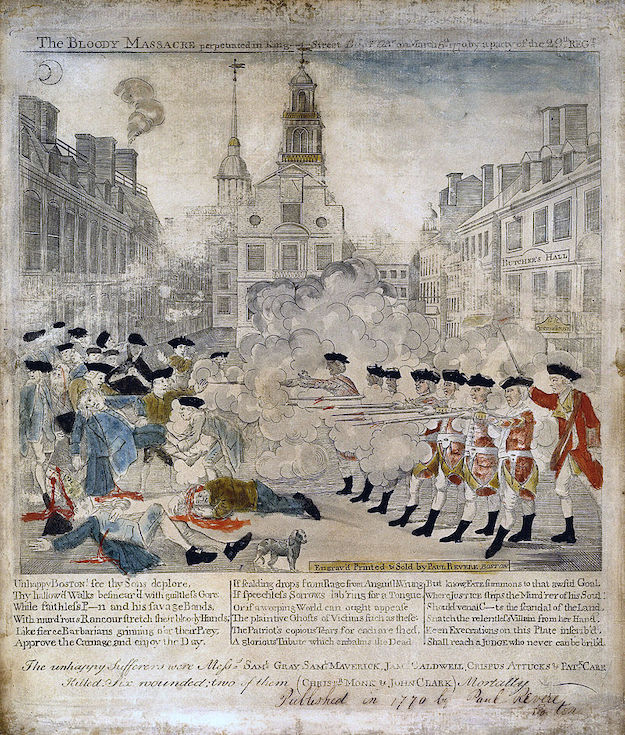
This famous depiction of the Boston Massacre was engraved by Paul Revere (copied from an engraving by Henry Pelham), colored by Christian Remick, and printed by Benjamin Edes. The Old State House is depicted in the background. / Library of Congress
Different Conceptions of Colonists’ Relationship to Britain
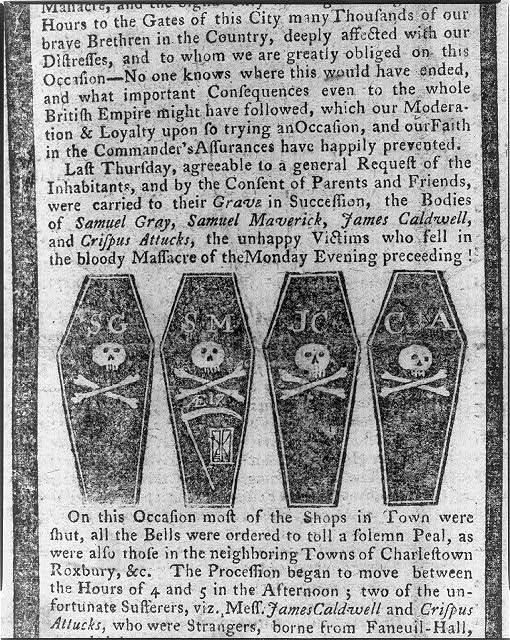
Article by Samuel Adams in the Boston Gazette about the Boston Massacre
Following the the Boston Massacre in 1770, there were different ways in which both onlookers in the British government and the colonists ended up wondering, each one, if the other one was somehow engaged in a plot. Right? And I mentioned that the British were perhaps wondering if this had all been a plot to rob the customs house; the colonists were wondering about the possibility of this being some kind of ongoing plot to subdue and repress the American colonists. So clearly at the end of the lecture from last week you can really begin to sense a growing sense of mounting hostility, even among some people a sense of growing alienation.
And you can hear this on both sides coming from the accounts of the Boston Massacre by both Gage and Adams. And I did mention in class when I read from them that they were of course writing with a purpose in mind so they were interested in being particularly bold and dramatic in what they were saying. Gage really had to excuse what happened and Adams was trying to promote people to get upset about what had happened, but even so you can hear even just in the way that they framed their accounts some of what I’m talking about here with growing hostility, growing alienation. Continue reading
Charles Mason: A Voice of Reason
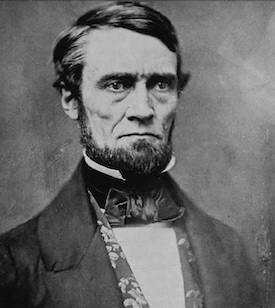
Charles Mason
Today, as it was a hundred and sixty years ago, America stands on the edge of an ever-widening chasm of cultural, ideological, political, racial and sectional divisions. In 1860, there was at least one prominent voice of reason that cried out to end the nation’s mad rush into the abyss, that of Charles Mason of Iowa. Mason was a Northern Democrat who not only understood the conflicting issues that were then pulling the nation apart, but reasonably viewed the rights and wrongs of both secession and slavery, as well as strongly opposing Lincoln’s invasion of the South to militarily force the departed States back into the Union. Like many others in both the North and South, Mason did not approve of secession, but felt that as there was nothing in the Constitution to bar a State from abrogating its contract with America and peacefully withdrawing from the Union, that it was solely a matter for the people of each State to decide on their own. His fervent hope though was that if secession did become a reality and a new Southern nation created, that the two countries could then begin to negotiate their differences in a peaceful manner, somehow resolve them and ultimately reunite. Continue reading
1864 ~ Gold Speculation
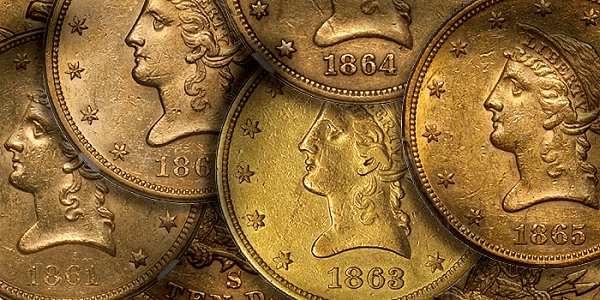
The Union’s financial success depended on military success. As presidential aide John Hay wrote in an anonymous newspaper article in January 1862 when any movement by the Union Army was stalled: “The Secretary of Finance has displayed wonderful zeal and ability in filling a bankrupt treasury and supplying the sinews of war. In this respect, Mr. Chase has accomplished a herculean task, but all his plans and efforts will end in ruin unless followed by wholesome legislative enactments and decided military movements. Already the treasury notes have commenced to depreciate, and a few months of Congressional and military inaction, they will sink to a level with the old Continental Scrip or the assignats of the French Revolution.” Continue reading
Juneteenth: Our Other Independence Day
Two and a half years after the Emancipation Proclamation, American slavery came to an end and a celebration of freedom was born
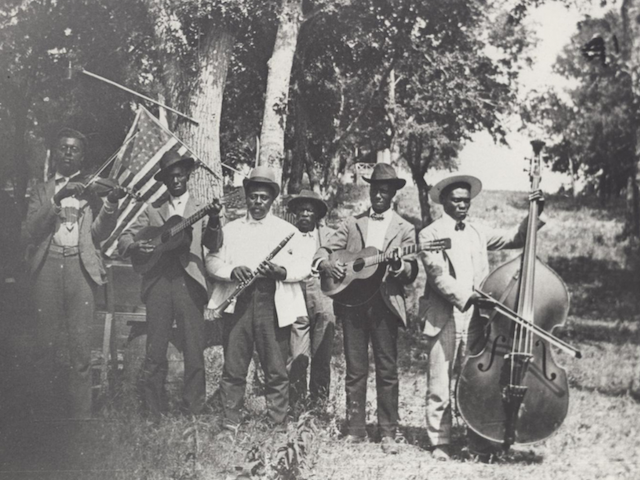
Since this article was first published in 2011, Juneteenth celebrations have attracted increased attention around the nation. According to the National Juneteenth Observance Foundation, 45 states and the District of Columbia had, by 2017, passed legislation officially recognizing the holiday. With the current unrest over the killing of another African American man at the hands of the police, the pervasive scars of the nation’s long history of enslavement and racism has again dominated the news. Protests across the country have brought renewed attention to the holiday, as has President Trump’s recent announcement of a campaign rally being held in Tulsa, itself the site of a horrific race massacre, on Juneteenth.
Amid all of this, not to mention the COVID-19 pandemic that is disproportionately affecting the country’s black population, Americans have even more reasons to continue learning about the roots of racism in American history. We must confront the great contradiction in our past—that a “nation conceived in liberty” was also born in shackles.
Continue reading
The Pardon of Jefferson Davis and the 14th Amendment
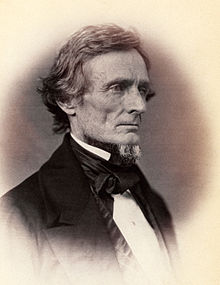 On October 17, 1978, President Jimmy Carter officially restored the full citizenship rights of former Confederate president Jefferson Davis, signing an act from Congress that ended a century-long dispute.
On October 17, 1978, President Jimmy Carter officially restored the full citizenship rights of former Confederate president Jefferson Davis, signing an act from Congress that ended a century-long dispute.
Davis is most remembered today as one of the leaders of the Confederacy, along with General Robert E. Lee. In 1976, Lee’s citizenship was restored by Congress, also about a century after Lee’s death after the Civil War. The restoration of Davis’ citizenship soon followed.
“In posthumously restoring the full rights of citizenship to Jefferson Davis, the Congress officially completes the long process of reconciliation that has reunited our people following the tragic conflict between the States,” the resolution read on October 17, 1978. Continue reading
The History of Political Parties in the united States
“Two things are infinite: the universe and human stupidity; and I’m not sure about the universe.” ~ Albert Einstein

Erasing History ~ Image: Lance Page
~ Forewords ~
The following is based solely upon my understanding of what I have uncovered so far by a study of history. If any of my facts are incorrect I beg that those more knowledgeable than I please correct me, and I will issue a statement reflecting where I have erred. However, if you disagree with anything I say simply because it is not what you were taught in school, or because it offends you, then I also kindly ask that you keep your comments to yourself. ~ Neal Ross, author and historian Continue reading
African Americans and the fight for the Alamo
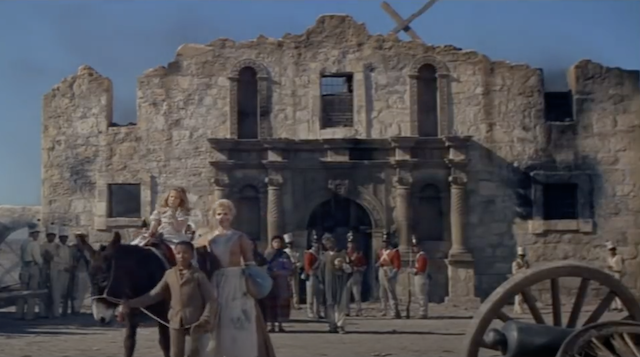
It was early March 1836; a sad little procession moved slowly down a south Texas road. A young mother rode a pony, holding her fifteen months old baby daughter, and a black man walked beside her, acting as escort. Just a few days earlier, this trio of weary travelers had witnessed the fall of the mission fortress, the Alamo. There, the Mexican forces of General Antonio Lopez de Santa Anna made the woman, Susannah Arabella Dickinson, a widow. Continue reading
The Danger of American Fascism
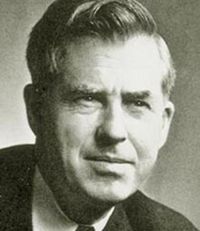 On returning from my trip to the West in February, I received a request from The New York Times to write a piece answering the following questions:
On returning from my trip to the West in February, I received a request from The New York Times to write a piece answering the following questions:
* What is a fascist?
* How many fascists have we?
* How dangerous are they?
A fascist is one whose lust for money or power is combined with such an intensity of intolerance toward those of other races, parties, classes, religions, cultures, regions or nations as to make him ruthless in his use of deceit or violence to attain his ends. The supreme god of a fascist, to which his ends are directed, may be money or power; may be a race or a class; may be a military, clique or an economic group; or may be a culture, religion, or a political party. Continue reading
The Enslaved Household of the Grant Family
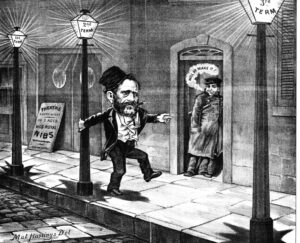
Caricature of Ulysses S. Grant inebriated. (Library of Congress
Women are often overlooked in history for their role in the institution of slavery. First Lady Julia Dent Grant, wife of President Ulysses S. Grant, was a steadfast slave mistress for more than half of her life—an often forgotten part of her identity. Though Grant himself grew up in an abolitionist family in the free state of Ohio, his marriage to Julia Dent led him to become involved in slavery while the two lived in Missouri on Julia’s family estate. As a result, Ulysses Grant was the last U.S. president to have owned an enslaved individual. Grant’s legacy as the respected Commanding General of the Union Army, and his efforts as president to protect black citizenship have long obscured his personal slave-ownership, as well as that of his beloved wife. Continue reading
BREAKING NEWS: Seventy-Two Killed Resisting Gun Confiscation In Maryland
National Guard units seeking to confiscate a cache of recently banned assault weapons were ambushed by elements of a Para-military extremist faction. Military and law enforcement sources estimate that 72 were killed and more than 200 injured before government forces were compelled to withdraw.
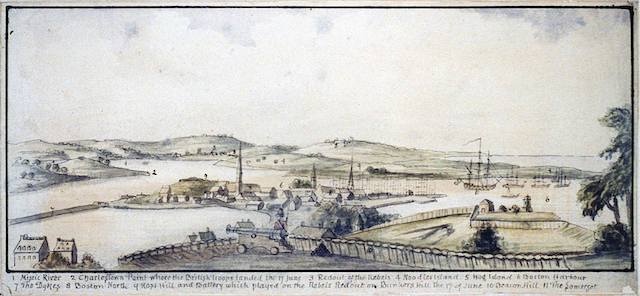
Siege of Boston, April 20, 1775
Speaking after the clash, Massachusetts Governor Thomas Gage declared that the extremist faction, which was made up of local citizens, has links to the radical right-wing tax protest movement. Continue reading
Americans are Academically Ill-Equipped to Defend the Constitution

“A republic, if you can keep it,” Benjamin Franklin allegedly quipped when asked what type of government the Constitutional Convention had crafted for the United States. More than two centuries later, astonishingly low levels of civic literacy suggest Americans are academically ill-equipped to do so. Continue reading
The Late Murray Rothbard Takes on the Constitution
A lost volume of American history finds the light of day…

The Constitution is traditionally seen as the culmination of the American Revolution. But in the fifth and final volume of Conceived in Liberty, the libertarian firebrand Murray Rothbard portrays it as a reactionary counterrevolution against the Revolution’s radical principles, orchestrated by a powerful array of monied interests who hoped a more centralized government would reproduce many hierarchical and mercantilist features of the 18th century British state. Continue reading
The 13th Amendment to the united States Constitution
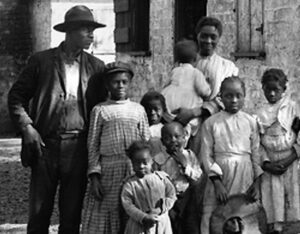 The 13th Amendment to the U.S. Constitution, ratified in 1865 in the aftermath of the Civil War, abolished slavery in the United States. The 13th Amendment states: “Neither slavery nor involuntary servitude, except as a punishment for crime whereof the party shall have been duly convicted, shall exist within the United States, or any place subject to their jurisdiction.” Continue reading
The 13th Amendment to the U.S. Constitution, ratified in 1865 in the aftermath of the Civil War, abolished slavery in the United States. The 13th Amendment states: “Neither slavery nor involuntary servitude, except as a punishment for crime whereof the party shall have been duly convicted, shall exist within the United States, or any place subject to their jurisdiction.” Continue reading
John Quincy Adams, Andrew Jackson and the “Tariff of Abominations“
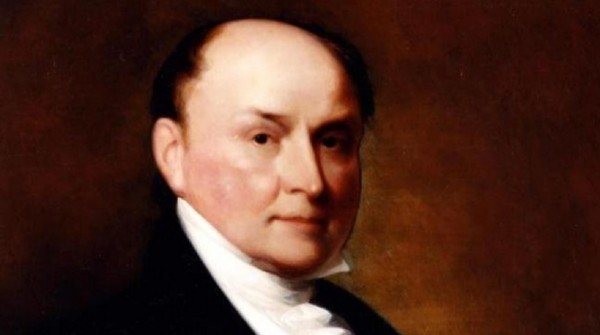
John Quincy Adams is generally regarded as an excellent diplomat and an outstanding abolitionist but not a great president. That’s not an altogether fair assessment. Adams did not enjoy universal respect due to the manner in which he became president. (He finished second in the popular vote and electoral college, but since no candidate had a majority of electoral votes, the House of Representatives decided the outcome.) Adams was stymied by a Congress controlled by his political enemies. His lack of doling out patronage appointments didn’t win him any friends either. But as president, Adams made some strides in modernizing the American economy and promoting education. He also succeeded in paying off much of the national debt. Continue reading
How Taxes Caused the Civil War ~ NOT Slavery!
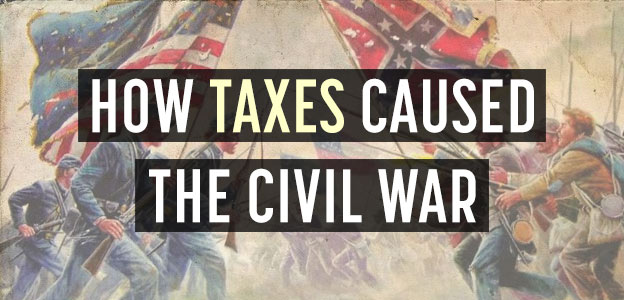
Taxes caused the Civil War: Although I’m no scholar of American history, there are a few seminal events that I’ve always felt confident in having a basic understanding of. One of those is the cause of the Civil War, which was slavery, of course. But then, I did some research, and I had to rethink everything.
It seems that the root cause of the Civil War was not slavery, it was taxation. Continue reading
We Fought with America in the Vietnam War, but Most Americans Don’t Know About Us
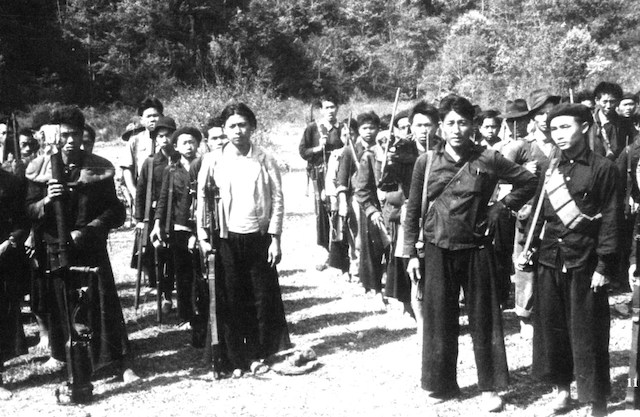
Many know the Vietnam War as one of the bloodiest and most unpopular wars in U.S. history. Some even label it a mistake. During the 1960s, the spread of communism brought fear to the American people. For the U.S. government, communism posed a political threat as the Soviet Union, China, North Korea, and other countries started emerging as “red” states. They were afraid more dominoes would fall, so they placed themselves between them. American representatives were sent to Vietnam and neighboring countries to prevent the spread. This is where the story of my people begins. Continue reading
